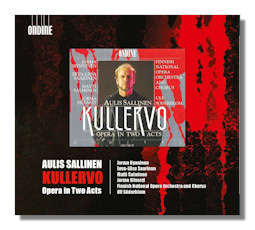
The Internet's Premier Classical Music Source
Related Links
- Sallinen Reviews
- Latest Reviews
- More Reviews
-
By Composer
-
Collections
DVD & Blu-ray
Books
Concert Reviews
Articles/Interviews
Software
Audio
Search Amazon
Recommended Links
Site News
 CD Review
CD Review
Aulis Sallinen

Kullervo, Op. 61
- Satu Vihavainen, soprano (sister)
- Anna-Lisa Jakobson, mezzo soprano (the Smith's wife)
- Eeva-Liisa Saarinen, mezzo soprano (mother)
- Paula Etelävuori, alto (Unto's wife)
- Matti Heinikari, tenor (first man)
- Pertti Makela, tenor (hunter)
- Jorma Silvasti, tenor (Kimmo)
- Jorma Hynninen, baritone (Kullervo)
- Juha Kotilainen, baritone (Unto)
- Esa Ruuttunen, baritone (second man)
- Matti Putkonen, bass (Tiera)
- Matti Salminen, bass (Kalervo)
- Vesa-Matti Loiri, voice (blind singer)
Finnish National Opera Chorus
Finnish National Opera Orchestra/Ulf Söderblom
Ondine ODE1258 3CDs
The Finnish mythology is a rich, ancient and a somehow very honest, human mythology. Kullervo is the tragic anti-hero in the Kalevala national epic; these are both, of course, the inspiration and subject of one of Sibelius' first successful works, the eponymous choral symphony. Here – on a three-CD set from Ondine – is a full scale opera by Finnish composer, Aulis Sallinen, who was born in 1935. It's his fourth opera and was written in 1988 as Opus 61. A prolific composer, Sallinen's music might be characterized as a supremely self-confident blend of established forms (the symphony, opera, concerto, quartet etc) and tonal/harmonic language with an accessible contemporary soundscape.
Previously released as ODE780-3T in the early 1990s, this is the recording made in 1991 with the Finnish National Opera Orchestra, Finnish National Opera Chorus and soloists under Ulf Söderblom – apparently before it was publicly premièred, in Los Angeles less than six months later. The libretto for the two-act work is by Sallinen himself and uses a play by Aleksis Kivi (1834-1872) which in turn is based on and derived from the Kalevala. There are though, it's to be noted, characters in that text who do not appear in the Kalevala itself.
Kullervo in some ways represents a natural extension of, or at least deals with themes successive to, Sallinen's earlier operas… personal, intimate love and social comment in particular. Kullervo appears in Cantos 31 to 36 of the Kalevala. Like figures such as Heathcliff and Peter Grimes, Kullervo is at the center of a relatively lawless world. It's a pagan, rough, unforgiving one which seems to operate on pragmatic lines: be in the wrong place at the wrong time and there is little predictable or reliable redress for whatever evil or destruction may result.
The story is nothing if not grim. Although general analogs to Kullervo's sad life and fiery end are relevant, this opera concerns his particular story; it concentrates on his own character. Kullervo seems to have been born determined to wreak revenge on the tribe of Untamo, who has killed everyone in Untamala (Kullervo's mother's) tribe. By the end of the first act, Kullervo has done enough to alienate the other protagonists (even his mother would have him slain), and perhaps distance us listeners. The rage and recklessness (he ravishes his own sister and fails to build on his relationship with the one person, Kimmo, who could be an ally or support) that seem to define Kullervo grow to dominate his life and actions even further; they culminate in Scene 5 in his burning his mother's house. Then in his own death by fire.
You're likely to be struck at once by the enthusiasm and commitment of the singers on this recording. Both the Finnish National Opera Orchestra and Chorus under Ulf Söderblom achieve a nice blend of forward movement at every necessary point. And attention to detail. This makes for a performance that is neither too histrionic or spuriously epic where the tragedies fail to effect us because they're merely mythic; nor falsely personal, romantic or indulgent. Kullervo and his concerns are real. But set in a believable musical context.
Kullervo (baritone Jorma Hynninen) himself in particular is compelling. Despite the disasters in the story, like Grimes he's not without power to elicit our sympathy: the anger which he feels leading to his murder of the blacksmith's wife is provoked: stones have been put in his bread; nor can Kullervo be expected to befriend Kimmo and perhaps avert the final tragedy… Kimmo has lost his mind. Hynninen balances these factors credibly. Similarly, soprano Eeva-Liisa Saarinen (the mother) projects hope and light in contrast to the others' tendencies to destruction.
An adaptation of the story of Kullervo could easily have degenerated into a (series of) histrionic or spuriously gruesome episodes. But not only has Sallinen's experience and love of originality made for a psychologically penetrating whole; additionally, the sensitivity of Söderblom and his performers' approach to the work has guaranteed that the recording is taut, effective and rewarding.
The acoustic has held up well over more than 20 years. The recording was made in the presence of the composer in the House of Culture in Helsinki. It's clear; it supports the subdued drama of the work well. The booklet has a short introduction to Sallinen's relationship with his subject matter and the impetus of the opera's composition; a very helpful synopsis; and the full text in Finnish and English. It's good to have this major work from a major composer working in a major culture for contemporary music available again. (Finland's support of its composers is exemplary). Enthusiasts for composer, Finnish music and contemporary opera will not want to miss this release.
Copyright © 2014, Mark Sealey


















